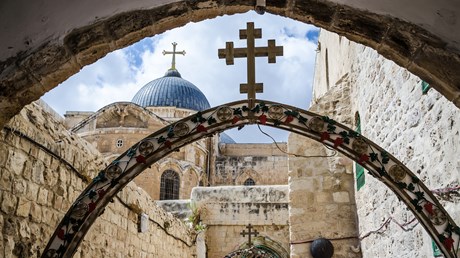Both pilgrims and pleasure seekers allow Arab believers to resist exodus amid ISIS.

Call Ann Fink crazy, but the intrepid grandmother has a tradition to uphold. She’s toured Israel, Jordan, and Egypt with 8 of her 13 granddaughters. Victoria, a preteen, is number 9.
“Her parents are not afraid,” said Fink, a Pennsylvania native, while visiting Egypt with Victoria. “We believe we can die at any time. Only God knows when and where.”
Neither tourist knew just how much visits like theirs support the region’s beleaguered Christians.
From a high-water mark of $7.2 billion in 2010, tourism revenue in Egypt has fallen by 76 percent following the unrest of the Arab Spring. The decline has devastated the economy and, with it, Egypt’s Christians.
Copts, an estimated 10 percent of the population, make up more than half of tour operators and more than a quarter of the tourism workforce, according to Adel el-Gendy, a general manager in the Tourism Development Authority. Christians have better connections to the West, he said, and are often more skilled with languages.
Gendy, a Muslim, has been assigned development of the Holy Family route—25 locations that, according to tradition, were visited by Jesus, Joseph, and Mary as they fled Herod’s wrath. Relaunched with government and church fanfare in 2014, the route is close to being designated as a World Heritage site by UNESCO, he said. But the project has struggled as tourists stay away.
The route runs through Old Cairo, which boasts churches dating back to the fourth century but feels like a ghost town. Souvenir shops are open, but their lights dim. “Our income has dropped by 90 percent,” said Angelos Gergis, the Coptic Orthodox priest at St. Sergius Church, built above a cave where tradition says the Holy Family …
Source: Christianity Today Most Read